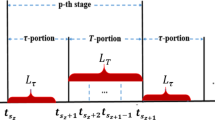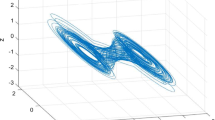Abstract
Fault detection and isolation (FDI) problems for linear parameter-varying (LPV) systems with state time-delays are studied in this paper. By defining the concept of unobservability subspace and designing its calculation algorithm, the geometric approach is introduced to the time-delay LPV systems. Utilizing Wirtinger-based integral inequality, we obtain a sufficient condition to solve the so-called H∞-based residual generation problem for the LPV systems. In this paper, we consider two cases: the time delay is known and the time delay is unknown but its estimated value can be obtained. Corresponding observers are proposed for both cases based on the geometric approach and H∞ techniques. Lyapunov-Krasovskii functional is utilized to handle the time-delays and Wirtinger’s inequality is employed to reduce conservatism. Numerical examples are presented to demonstrate the effectiveness of the proposed approach.
Similar content being viewed by others
References
Straka O, Punčochář I. Distributed design for active fault diagnosis. Int J Syst Sci, 2022, 53: 562–574
Huang D R, Hua X X, Mi B, et al. Incipient fault diagnosis on active disturbance rejection control. Sci China Inf Sci, 2022, 65: 199202
He X, Guo Y Q, Zhang Z, et al. Active fault diagnosis for dynamic systems. Acta Autom Sin, 2020, 46: 1557–1570
Hu J, Wang Z D, Liu G P. Delay compensation-based state estimation for time-varying complex networks with incomplete observations and dynamical bias. IEEE Trans Cybern, 2022, 52: 12071–12083
Pang Z H, Xia C G, Zhai W F, et al. Networked active fault-tolerant predictive control for systems with random communication constraints and actuator/sensor faults. IEEE Trans Circuits Syst II, 2022, 69: 2166–2170
Zou L, Wang Z D, Hu J, et al. Communication-protocol-based analysis and synthesis of networked systems: progress, prospects and challenges. Int J Syst Sci, 2021, 52: 3013–3034
Zhang Z, He X. Active fault diagnosis for linear systems: within a signal processing framework. IEEE Trans Instrum Meas, 2022, 71: 3505009
Qin L G, He X, Yan R Y, et al. Active fault-tolerant control for a quadrotor with sensor faults. J Intell Robot Syst, 2017, 88: 449–467
Wang Y A, Shen B, Zou L. Recursive fault estimation with energy harvesting sensors and uniform quantization effects. IEEE CAA J Autom Sin, 2022, 9: 926–929
Bu X Y, Dong H L, Wang Z D, et al. Non-fragile distributed fault estimation for a class of nonlinear time-varying systems over sensor networks: the finite-horizon case. IEEE Trans Signal Inf Process over Networks, 2019, 5: 61–69
Cao F F, Zhang Z, He X. Active fault isolation of over-actuated systems based on a control allocation approach. IEEE Trans Instrum Meas, 2022, 71: 3513410
Cai M, He X, Zhou D H. Performance-improved finite-time fault-tolerant control for linear uncertain systems with intermittent faults: an overshoot suppression strategy. Int J Syst Sci, 2022, 53: 3408–3425
Gao C, Wang Z D, He X, et al. Fault-tolerant consensus control for multiagent systems: an encryption-decryption scheme. IEEE Trans Automat Contr, 2022, 67: 2560–2567
Xue T, Ding S X, Zhong M, et al. An integrated design scheme for SKR-based data-driven dynamic fault detection systems. IEEE Trans Ind Inf, 2022, 18: 6828–6839
Zhang J F, Zhang Q H, He X, et al. Compound-fault diagnosis of rotating machinery: a fused imbalance learning method. IEEE Trans Contr Syst Technol, 2020, 29: 1462–1474
Mukaidani H, Xu H. Robust SOF Stackelberg game for stochastic LPV systems. Sci China Inf Sci, 2021, 64: 200202
Weiss Y, Allerhand L I, Arogeti S. Yaw stability control for a rear double-driven electric vehicle using LPV-H∞ methods. Sci China Inf Sci, 2018, 61: 070206
Duan G R. Fully actuated system approaches for continuous-time delay systems: part 1. Systems with state delays only. Sci China Inf Sci, 2023, 66: 112201
Liu W Y, Bai Y J, Jiao L, et al. Safety guarantee for time-delay systems with disturbances. Sci China Inf Sci, 2023, 66: 132102
Hou T, Liu Y Y, Deng F Q. Stability for discrete-time uncertain systems with infinite Markov jump and time-delay. Sci China Inf Sci, 2021, 64: 152202
Han Y T, Xu Z, Guo H. Robust predictive control of a supercavitating vehicle based on time-delay characteristics and parameter uncertainty. Ocean Eng, 2021, 237: 109627
Tasoujian S, Salavati S, Franchek M A, et al. Robust delay-dependent LPV synthesis for blood pressure control with real-time Bayesian parameter estimation. IET Control Theor Appl, 2020, 14: 1334–1345
Zhang X P, Tsiotras P, Knospe C. Stability analysis of LPV time-delayed systems. Int J Control, 2002, 75: 538–558
Hassanabadi A H, Shafiee M, Puig V. Actuator fault diagnosis of singular delayed LPV systems with inexact measured parameters via PI unknown input observer. IET Control Theor Appl, 2017, 11: 1894–1903
Hamdi H, Rodrigues M, Mechmeche C, et al. Observer-based fault diagnosis for time-delay LPV descriptor systems. IFAC-PapersOnLine, 2018, 51: 1179–1184
Xu F, Tan J B, Wang X Q, et al. Generalized set-theoretic unknown input observer for LPV systems with application to state estimation and robust fault detection. Int J Robust Nonlinear Control, 2017, 27: 3812–3832
Massoumnia M A. A geometric approach to the synthesis of failure detection filters. IEEE Trans Automat Contr, 1986, 31: 839–846
Massoumnia M A, Verghese G C, Willsky A S. Failure detection and identification. IEEE Trans Automat Contr, 1989, 34: 316–321
Bokor J, Balas G. Detection filter design for LPV systems—a geometric approach. Automatica, 2004, 40: 511–518
Balas G, Bokor J, Szabo Z. Invariant subspaces for LPV systems and their applications. IEEE Trans Automat Contr, 2003, 48: 2065–2069
Basile G, Marro G. Controlled and Conditioned Invariants in Linear System Theory. Englewood Cliffs: Prentice Hall, 1992
Meskin N, Khorasani K. Robust fault detection and isolation of time-delay systems using a geometric approach. Automatica, 2009, 45: 1567–1573
Meskin N, Khorasani K. Fault detection and isolation of distributed time-delay systems. IEEE Trans Automat Contr, 2009, 54: 2680–2685
Meskin N, Khorasani K. A geometric approach to fault detection and isolation of continuous-time Markovian jump linear systems. IEEE Trans Automat Contr, 2010, 55: 1343–1357
Seuret A, Gouaisbaut F. Wirtinger-based integral inequality: application to time-delay systems. Automatica, 2013, 49: 2860–2866
Park P G, Ko J W, Jeong C. Reciprocally convex approach to stability of systems with time-varying delays. Automatica, 2011, 47: 235–238
Yang X Q, Yin S, Kaynak O. Robust identification of LPV time-delay system with randomly missing measurements. IEEE Trans Syst Man Cybern Syst, 2018, 48: 2198–2208
Yang X Q, Huang B, Gao H J. A direct maximum likelihood optimization approach to identification of LPV time-delay systems. J Franklin Institute, 2016, 353: 1862–1881
Bayrak A, Tatlicioglu E. A novel online adaptive time delay identification technique. Int J Syst Sci, 2016, 47: 1574–1585
Ren X M, Rad A B. Identification of nonlinear systems with unknown time delay based on time-delay neural networks. IEEE Trans Neural Netw, 2007, 18: 1536–1541
Wu F, Grigoriadis K M. LPV systems with parameter-varying time delays: analysis and control. Automatica, 2001, 37: 221–229
Briat C, Sename O, Lafay J F. Memory-resilient gain-scheduled state-feedback control of uncertain LTI/LPV systems with time-varying delays. Syst Control Lett, 2010, 59: 451–459
Hu Y M, Duan G. H∞ finite-time control for LPV systems with parameter-varying time delays and external disturbance via observer-based state feedback. J Franklin Institute, 2019, 356: 6303–6327
Zope R, Mohammadpour J, Grigoriadis K, et al. Delay-dependent H∞ control for LPV systems with fast-varying time delays. In: Proceedings of the 2012 American Control Conference, Montreal, 2012. 775–780
Acknowledgements
This work was supported by National Natural Science Foundation of China (Grant No. 61733009), National Key Research and Development Program of China (Grant No. 2022YFB25031103), and Huaneng Group Science and Technology Research Project.
Author information
Authors and Affiliations
Corresponding author
Rights and permissions
About this article
Cite this article
Zhang, Z., He, X. Fault detection and isolation for linear parameter-varying systems with time-delays: a geometric approach. Sci. China Inf. Sci. 66, 172202 (2023). https://doi.org/10.1007/s11432-022-3632-2
Received:
Revised:
Accepted:
Published:
DOI: https://doi.org/10.1007/s11432-022-3632-2




